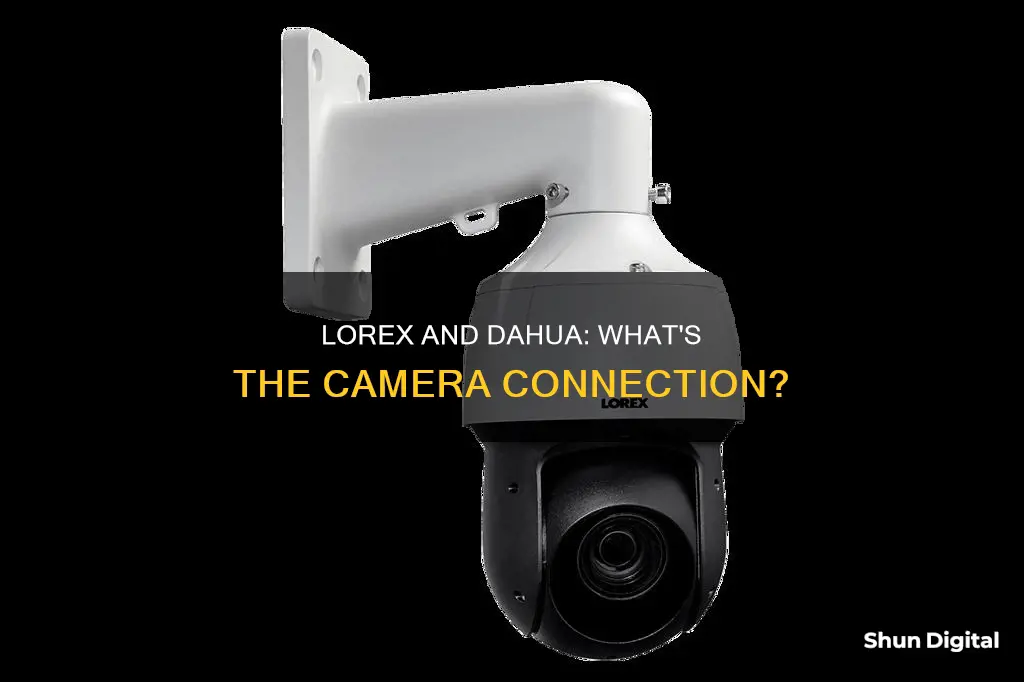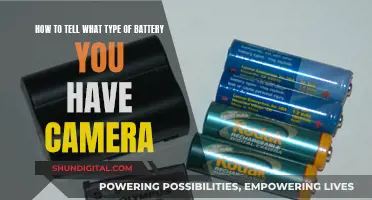
Dahua Technology is a Chinese video surveillance equipment manufacturer based in Hangzhou, China. It was founded in 2001 by former defence industry technician Fu Liquan, who is also the company's chairman. In 2018, Dahua acquired Lorex, a provider of DIY and SMB video surveillance products, for $29 million. Lorex, which is located in Canada, serves as a marketing storefront for Dahua, allowing the company to market its products into the USA from Canada. Lorex was previously owned by FLIR Systems, which acquired the company in 2012 for $60 million.
What You'll Learn
- Lorex is a subsidiary of Dahua Technology, a Chinese manufacturer
- Dahua acquired Lorex from FLIR Systems in 2018 for $29 million
- Lorex is banned in the US due to Dahua's involvement in Uyghur surveillance
- Dahua has a reputation for disorganisation and poor management
- Dahua is the second-largest video surveillance company in the world

Lorex is a subsidiary of Dahua Technology, a Chinese manufacturer
Lorex is a marketing storefront for its parent company, Dahua, in the United States. By operating in Canada, Lorex can undercut US-based suppliers and force prices into a false discount level that significantly impacts US jobs and the US security market, a practice known as "dumping."
Dahua Technology is a publicly traded company based in Hangzhou, China, and was founded in 2001 by former defense industry technician Fu Liquan. As of 2021, Dahua is the second-largest video surveillance company in the world in terms of revenue, after Hikvision.
In 2021, Best Buy, Home Depot, and Lowe's stopped selling Lorex-branded Dahua products due to concerns about Dahua's complicity in surveillance and human rights violations in Xinjiang, China. Despite this, Lorex continues to operate as an independent and autonomous business unit within Dahua, bringing strong relationships with leading North American retailers.
Charging Your D90 Camera: A Step-by-Step Guide
You may want to see also

Dahua acquired Lorex from FLIR Systems in 2018 for $29 million
In February 2018, Dahua Technology, a China-based video surveillance company, acquired Lorex and FLIR SMB Surveillance from FLIR Systems for $29 million. FLIR Systems is a thermal camera manufacturer that serves military, critical infrastructure, and enterprise markets.
FLIR's sale of Lorex, a provider of DIY and SMB video surveillance products, marked its exit from the DIY and small to medium-sized security products business. Dahua had been the primary OEM supplier to Lorex. The acquisition included over 100 products, including all Lorex, Digimerge, and FLIR visible spectrum SMB products.
FLIR initially acquired Lorex in 2012 for $59 million as part of an effort to bring thermal imaging technology to a broader customer base. However, the consumer segment was no longer viewed as strategic for their security business, and FLIR shifted its focus to critical infrastructure and enterprise market verticals.
Lorex, which generated $140 million in revenue in 2017, will continue to operate independently as an autonomous business unit within Dahua. The acquisition will enable Dahua to grow its business in the North American market, leveraging Lorex's strong relationships with leading retailers in the region.
The sale of Lorex to Dahua raised concerns among some industry professionals about the impact on integrators and the potential for margin compression. However, others believed that Dahua's direct competition with integrators would not significantly affect their business, as most end users would not know the relationship between Lorex and Dahua.
Lithium Batteries: Powering Your Camera
You may want to see also

Lorex is banned in the US due to Dahua's involvement in Uyghur surveillance
Lorex is a Canadian company that is owned by Dahua, a Chinese manufacturer. In 2019, Dahua was added to the U.S. government's economic sanctions list, alongside Hikvision, due to their involvement in supplying the Chinese government with surveillance technology used in the Xinjiang Uyghur Autonomous Region. The U.S. government has accused China of committing genocide against Uyghurs and other ethnic minorities, and has banned the use of Dahua and Hikvision products in federal facilities.
Despite Lorex not being banned from sale in the U.S., several major retailers, including Home Depot, Best Buy, and Lowe's, have stopped selling Lorex products due to their links to human rights abuses and ethical sourcing concerns. However, Costco has continued to sell Lorex products, despite warnings of cybersecurity risks and links to human rights abuses, which has drawn criticism from U.S. lawmakers.
In 2021, it was discovered that several federal agencies, including the military, had purchased Lorex equipment despite the ban. This led to calls for investigations and actions to prevent future purchases of banned equipment. While some agencies claimed that they were unaware of the NDAA ban or relied on suppliers for compliance, others removed the Lorex equipment from service.
In summary, while Lorex is not directly banned in the U.S., its association with Dahua and the company's involvement in Uyghur surveillance has led to a decline in sales and retailers discontinuing the brand. The U.S. government's ban on Dahua and federal agencies' illegal purchases of Lorex equipment have further complicated the situation and raised concerns about the origin of commercial equipment purchased by government departments.
Extending SpyPoint Camera Battery Life: How Long Should It Last?
You may want to see also

Dahua has a reputation for disorganisation and poor management
Dahua Technology, the Chinese manufacturer of Lorex cameras, has a reputation for disorganisation and poor management. The company has been implicated in several controversies, including human rights abuses, surveillance, and national security concerns, which have resulted in bans on the sale and use of their products in several countries.
The impact of disorganisation within Dahua is evident in the consequences of their actions. The company's involvement in the mass surveillance of Uyghurs in Xinjiang, China, and their complicity in human rights violations, has led to economic sanctions and blacklisting by the US government. This, in turn, has had financial implications for the company, with retailers such as Best Buy and Home Depot discontinuing the sale of Lorex and Ezviz products.
The disorganisation within Dahua is also reflected in the company's response to these controversies. Despite the serious nature of the allegations, Dahua has failed to take decisive action to address the concerns raised by various governments and human rights organisations. Instead, their responses have been characterised by ambiguity and a lack of transparency.
Additionally, Dahua's poor management practices have been exposed through cybersecurity vulnerabilities in their products. In 2016, a botnet attack was traced back to a vulnerability in Dahua cameras and DVRs, which allowed attackers to take control of the devices and infect them with malware. In 2017, a similar vulnerability was discovered, which allowed unauthorised access to devices and the potential to turn cameras into tools for cyberattacks. While Dahua issued firmware updates to fix these issues, their initial response and handling of the situation demonstrated a lack of proactive management and effective security measures.
The consequences of Dahua's disorganisation and poor management have been far-reaching. The company has faced economic and reputational damage, with retailers and governments distancing themselves from their products. The impact has also extended to Dahua's customers, who have had to deal with the fallout of using banned equipment and the potential security risks associated with the products.
In conclusion, Dahua's reputation for disorganisation and poor management is well-founded, as evidenced by their handling of controversial activities, cybersecurity issues, and the impact on their customers and partners.
Mastering Exposure Blending in Camera Raw
You may want to see also

Dahua is the second-largest video surveillance company in the world
Dahua Technology, also known as Zhejiang Dahua Technology Co., Ltd., is a Chinese company that manufactures video surveillance equipment. It is headquartered in Binjiang District, Hangzhou, and was founded in 2001 by former defence industry technician Fu Liquan, who is also the company's chairman. Dahua initially focused on manufacturing digital video recorders and, in 2008, it was listed on the Shenzhen Stock Exchange.
Dahua's success can be attributed to its competitive pricing, innovative technology, and focus on providing solutions rather than just products. It has invested heavily in research and development, with around 10% of its yearly revenue going into R&D. The company has four research institutes and over 6,000 R&D engineers working on cutting-edge technologies such as AI, IoT, cloud services, video, cybersecurity, and software reliability.
In 2018, Dahua acquired Lorex, a Canadian security video camera company. This acquisition contributed to Dahua's growth and expansion in the global market. However, in 2021, several major US retailers, including Best Buy, Home Depot, and Lowe's, stopped selling Lorex-branded Dahua products due to concerns about the company's involvement in surveillance and human rights violations in Xinjiang, China. Despite this setback, Dahua continues to expand its global presence and develop new technologies to maintain its position as one of the leading video surveillance companies in the world.
Finding Your Camera Charger: Quick Solutions
You may want to see also
Frequently asked questions
Yes, Dahua acquired Lorex in 2018.
Dahua was already the primary OEM supplier of video surveillance products to Lorex. The acquisition was intended to drive much higher volumes for camera sensors, thereby reducing costs.
Lorex continues to operate independently as an autonomous business unit. Lorex brings to Dahua strong relationships with leading North American retailers.
Lorex cameras may be rebranded as Dahua cameras. However, Dahua may choose to keep the Lorex brand to avoid channel conflicts and bad blood in the professional market.







